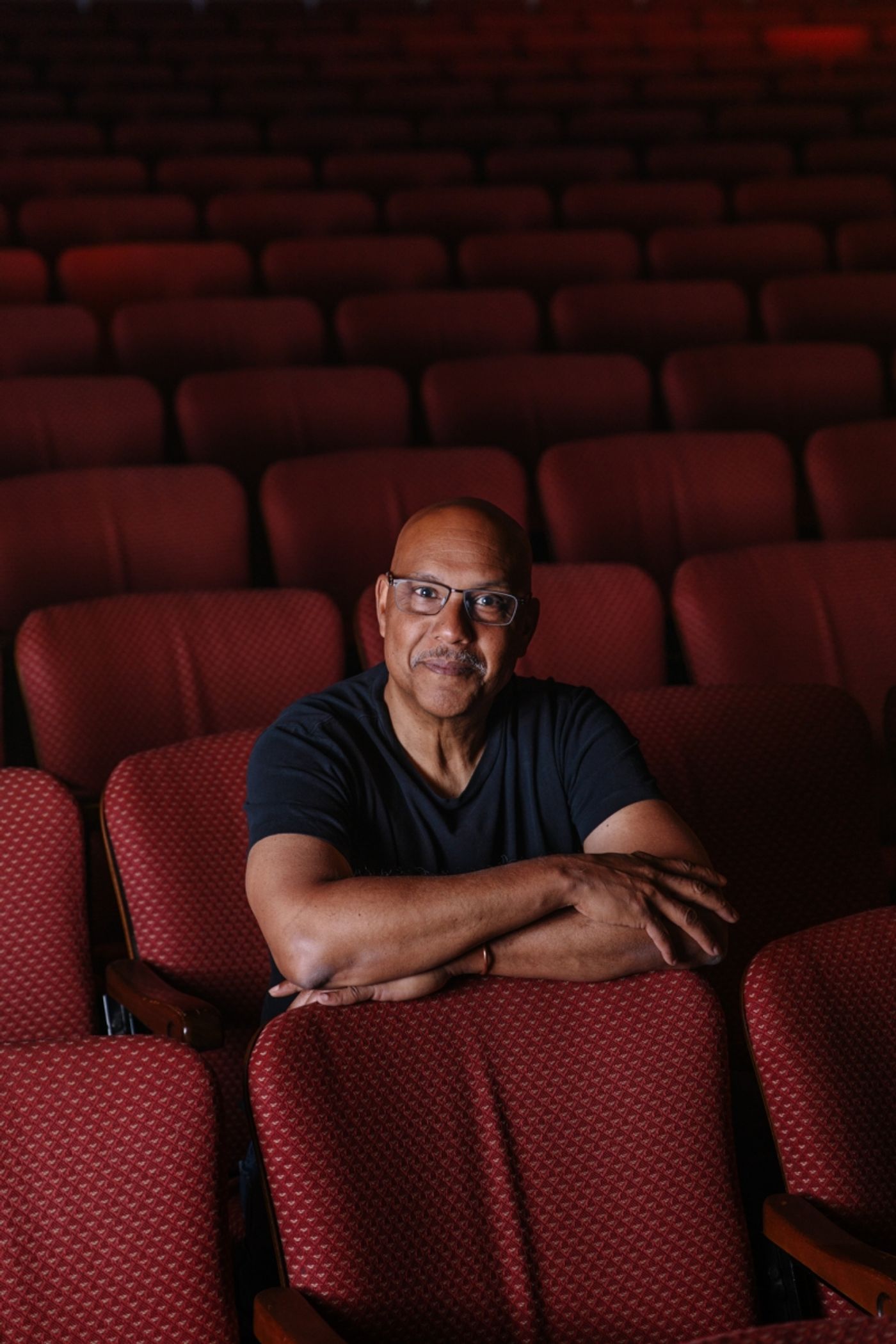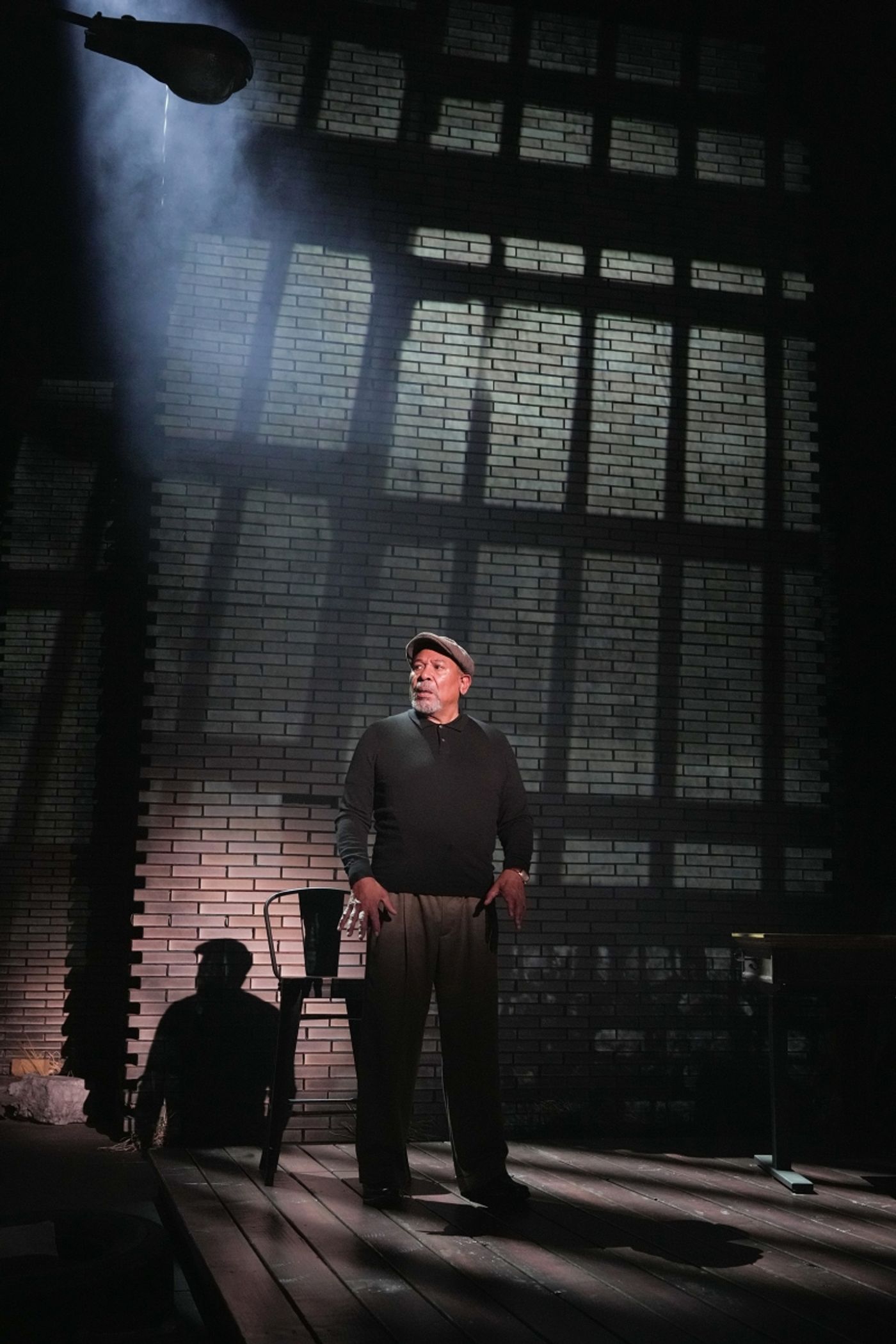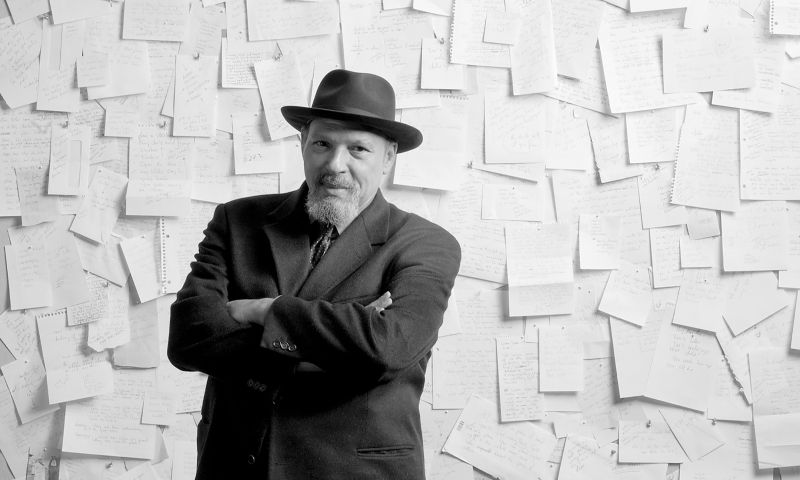Interview: Tim Bond of HOW I LEARNED WHAT I LEARNED at TheatreWorks Silicon Valley Relishes the Opportunity to Spend Time with August Wilson Once Again
Bond directs Wilson's theatrical memoir in Mountain View January 17th to February 3rd

at TheatreWorks Silicon Valley
(photo by Hillary Jeanne Photography)
Tim Bond may have stepped down as Artistic Director of TheatreWorks Silicon Valley just last summer, but happily he’s already back to direct August Wilson’s How I Learned What I Learned starring the estimable Bay Area theater veteran, Steven Anthony Jones. This is actually the third go-round for Bond and Jones on this particular play, after extremely well-received productions at Seattle Repr last year and Oregon Shakespeare Festival in 2022, where Bond now serves as Artistic Director.
Bond would seem to be the perfect director for this particular piece about Wilson’s formative years, as the master playwright was both a colleague and mentor to him. Bond fairly lights up when he recalls how years ago at Oregon Shakespeare Festival, Wilson would take him aside and regale him with the plots of whatever play he happened to be working on at the time. Those titles, such as Gem of the Ocean and King Hedley II, became part of the massive 10-part “Century Cycle” of plays covering African American history in the 20th century. While that cycle remains Wilson’s towering achievement, he also left behind what Bond describes as “the gift” of How I Learned What I Learned. This probing, inspirational and often funny solo work provides context for many of the characters and themes found in Wilson’s plays.
I spoke with Bond over the phone last week shortly after he’d arrived in town to commence rehearsals. We talked about why this particular piece is so meaningful to him, what it’s like directing something that Wilson had originally written for himself to perform, how things are going for him in his new position at Oregon Shakespeare Festival (OSF) where he has extensive prior history, and what he already misses about the Bay Area. Throughout, Bond was his usual upbeat, warm and thoughtful self, often punctuating his responses with an infectious laugh. The following conversation has been edited for length and clarity.
How I Learned What I Learned sounds distinctly different from August Wilson’s other plays. How would you describe it?
It’s an incredible gift that August has given us, in that he decided to write down the stories of the people he met along the way, from his boyhood and young adulthood growing up in Pittsburgh in the Hill District that ended up leading to the plays that he wrote in his 10-play cycle, and that shaped him as a young Black man growing up in America. It’s humorous, it’s full of his first loves, his encounters with racism, his first jobs when he was first setting out from his mother’s home and becoming a young man, and all sorts of sort of amazing moments that he experienced. It’s like sitting with August Wilson on his front stoop and having him spin tales about his life, and it’s a delightful hour and forty-five minutes of hearing those stories.

in the Oregon Shakespeare Festival production
of How I Learned What I Learned
(photo by Jenny Graham)
The piece was originally performed by Wilson himself, so I’m curious how the experience feels when there’s an actor playing the role.
Well, he writes in the stage directions that the character is “Actor,” even when he was playing it. Like the role he was playing was “actor” and the setting was “the crucible in which many a work of art has been fired.” Steven Anthony Jones, who is a great Wilsonian actor, Shakespearean actor, repertory actor and an amazing, amazing human being has been in many August Wilson plays and Moliere and you name it. He embodies the language and history of these characters in such a wonderful way that you kind of lose track that it’s not August Wilson. Steven is not trying to imitate him, he’s just fully embodying what he’s talking about.
For me personally, in a way it feels like I’m getting a chance to be with August again. It’s really special, and it’s uncanny. We did this production two years ago at OSF, and Constanza Romero who is August Wilson’s widow and the head of the estate and the dramaturg for our production and our costume designer (how lucky am I?!) – when we saw Steven out of the corner of our eye come out and he was sort of backlit onstage, we saw his silhouette and we both kind of broke into tears. It felt like August had just come back, because the silhouette is totally the silhouette of August Wilson. And Steven just captures the humor and the rambunctiousness and the power of August.
You’ve previously directed Jones in two other productions of this play, so you clearly enjoy working with him.
Steven is amazing. He is one of the great American actors. He was at A.C.T. for all those years in the company and teaching there, he was with the Negro Ensemble Company. Most recently, before he did this show he was in the Broadway touring production of Jitney. Finding veteran actors with those kinds of chops and with the kind of heart that Steven has – that’s the thing that I’ll say about August and about Steven. They have huge hearts, and that coming through in the theater is just magic, and so I love that guy.
For this new run at TheatreWorks, what are you still working on?
You know, we endlessly find new things with this play, which you do with any August Wilson play because he’s a poet, and in his poetry there’s so many layers of meaning and of metaphor. I think every new place we do it will have a different orientation and relationship to some of the issues that come up in the play. The second production of this we did was in Seattle, which was very dear to August and is mentioned very briefly in the play. He did it in Seattle 20 years ago last year, so it was the 20th anniversary of when the show had been done by August, and so it was very powerful for Steven to be doing that piece back in that place. People came and saw it who had seen the first production, and they were just knocked out. They were like “I had forgotten that story.” or “I’d forgotten this aspect of what August was talking about. It seems even more relevant today than it felt then.”
I’d actually wondered if certain things might resonate differently now than they did 20 years ago.
There’s a lot of things he’s talking about – like the divide between Black and white citizens in this country – that we’ve been talking about for a couple of hundred years, but August has a way of talking about it that’s so personal, and then so to the point, about how we are in this together and our histories are shared in this. Given what’s going on in the world right now and in America around the culture wars and the attempt by a number of people to bury the racialist history of America, it’s really refreshing, it’s really healing, it’s really galvanizing to hear this actor using August’s words to remind us of our shared histories.
I think it will be very interesting here in Mountain View when we bring our audience along that journey. I don’t know how much they’re talking or thinking about these things, but they have a profound effect on this upcoming election and on our democracy and on who we are as a nation. So it’s a larger piece than it seems on the page or that even I can describe to you. It has larger impact, beyond just a personal story about how one of the greatest playwrights of the 20th century became who he became. It’s also really about who we are as Americans, and how the power of art can illuminate these things.

(photo by David Cooper Photography)
Given that you knew August Wilson personally, was there anything about him that might surprise people who only know him through his plays?
Yes, many things, I suspect! He was very funny. He had a great giggle. He was an amazing storyteller, which is probably no surprise to anybody, but you know some people who write really well don’t necessarily speak a lot. August was an incredible orator, and you will get that in this play, you will hear this amazing ability to spin tales. He also did not suffer fools and had a rascal nature, a rambunctiousness about him that comes out in the play. I mean, from the very first half a minute of the play, he will surprise you. [laughs] He looks like he’s going in One Direction and then he just kind of pulls a string and suddenly you’re like “What?!” and he’s got you.
August was incredibly witty and had a tremendous ability even as a young man to stand up against forces that were trying to quell his creativity and his potential. A lot of what the play is about is self-discovery and self-determination. When young people have come to see the show, teenagers and people into their 20s and 30s, they are incredibly moved because he’s really speaking to that period in our lives and giving some beautiful lessons about how you stand up for yourself and find your voice.
August would take me out onto the bricks at Oregon Shakespeare Festival, and I had the privilege of hearing him tell me the last three plays that he was writing. He’d just say “Hey, you got a minute?” And then an hour and a half later, I would have heard the entire story of Gem of the Ocean, or King Hedley II, or Radio Golf. These were just amazingly mesmerizing, kind of hypnotic sessions where the rest of the world disappeared and he took me on a journey back into the past, he just transported me. In person, he was like was a very transformational sort of coyote character. He’d start talking to you and suddenly you’d just get transported somewhere, and then he’d put you back down again and you’d go, “Oh! I’m back in the 21st century and I’m talking to August Wilson!” [laughs]
It was really an incredible gift and privilege to spend any time with him, and that’s what this play does for people, they get that journey. He somehow captured it, you know?
I have to ask how things are going at Oregon Shakespeare Festival.
They’re going well, thank you. I mean, it’s tough for all the theaters coming out of the pandemic, and being a destination theater we’ve had a profound impact of people not traveling and all that, but it feels like when I arrived there in the summer, there was an upswell of people starting to come back to the Festival, and a positive energy of moving forward. We’ve gotten some really terrific support from folks from the Bay Area, from Portland, from Seattle and from Ashland obviously and it feels really, really good, like we’re on track to make a recovery. The question is how large will our scope be able to continue to be in the future, and we’re still figuring all that out.
But right now we’re getting ready to do a 10-show season, and it feels really good. I’ve been welcomed back there with open arms and it feels like I’m home. [laughs] I miss the Bay Area and I miss TheatreWorks, but I had set some deep roots there and it’s really nice to go back and reconnect.
Your decision to leave TheatreWorks seemed to come about very quickly, but I understand things may have been playing out behind the scenes for quite some time. What was that decision about for you?
Well, Oregon Shakespeare Festival from the moment I decided to go there [many years ago] was a dream opportunity for me. Being gone for the last 16 years has been an amazing journey for me through four states and four other significant positions that I’ve learned a tremendous lot on, and to return now as Artistic Director is sort of a dream for me. And it was a critical moment for the Festival’s survival, and I think it was really important that they had leadership at that moment when I joined them, with somebody who really had history and knew that place deeply, and had a deep love for Ashland and for Oregon Shakespeare Festival. So it was sort of a calling. Which is what all these jobs are – you are called to service, and I feel honored to have the opportunity to go back.
You know, there’s a line in Gem of the Ocean - Aunt Esther says to Citizen how many times you have to go back and pick up the ball, you know using a football metaphor, right? But like you’ve just gotta go back and grab that ball and keep going forward. I’ve always felt like I had unfinished business at OSF, and so you know I’m goin’ back to pick up the ball! [laughs] And I’ve kept my house there all these years, I raised my kid there, so it truly is my home - my artistic home and my actual home.
So those were the compelling reasons. I couldn’t let that place possibly go down, or lose its efficacy, so it was a strong, compelling reason for me to go back.
I realize regional theaters are in such dire straits these days that it wasn’t like you could tell the folks at OSF, “Oh, I’d love to come be your next artistic director, but I can’t start for another year or two.” There wasn’t that luxury of time.
No, it was an urgent moment, and luckily Giovanna Sardelli, who has been here for many years at TheatreWorks, was ready to take on the mantle of being Artistic Director here, so it was a very smooth transition in both places, really. It took a little time to figure out, but we figured it out.
It was just the right move for both theaters, fortunately. I miss TheatreWorks, but I’m really happy being at Oregon, and I’m really pleased to be able to come back and work on this show. I’ve come back to see the shows this season so far here, and I will try to come back to every show this season since I programmed them and chose the artists and all that, so I’m invested. It’s a great theater, and I hope to continue to come back and direct occasionally at TheatreWorks and other theaters throughout the Bay. There’s a lot of wonderful folks in the theater scene here that I’m sure I will continue to stay connected with, absolutely. I just love the Bay Area. It’s another home for me.
Is there anything you particularly miss about living in the Bay Area?
The redwoods, the ocean, the diversity of people who live in this region. It’s just so rich, with all the different folks from around the world who have settled here. I love that about the Bay Area, and it’ll continue to be an important place for me to return to.
---
How I Learned What I Learned will be presented January 17 – February 3, 2024 at Mountain View Center for the Arts, 500 Castro Street, Mountain View. For tickets and more information, visit TheatreWorks.org or call (877)-662-8978.
Videos

